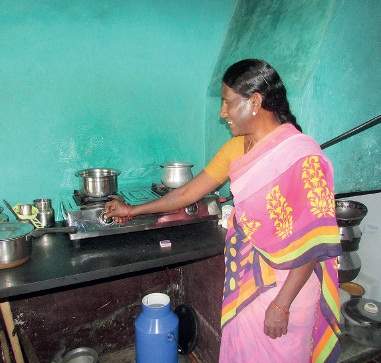
People at large are seen shifting to a more eco-friendly and sustainable lifestyle. Whether it’s the purchase of energy efficient appliances, catching a bus to cut down on vehicular emissions or even something as small as switching off the light when one leaves the room, everyone is doing their bit in one way or another to safeguard the environment. With the urban population leading the charge, it is only fitting that the rural population joins hands as well to make Swaach, eco-friendly India a reality.
That’s where the high flyers at IndiGo have come into the picture. With a voluntary contribution of `100 along with its airline fares, IndiGo in partnership with the Fair Climate Network and Accion Fraterna Ecology Centre has committed to setup 2,000 biogas units at Anantapur, Andhra Pradesh in a bid to reduce greenhouse gas emissions and promote climate friendly technologies.

In addition to being a eco-friendly initiative, the biogas units setup have changed the lives of these villagers who now have greater diversity in their diet, are less dependent on firewood for fuel, spend up to two hours lesser time in cooking, and show lesser signs of diseases such as pneumonia and health risks caused due to wood smoke.
“A steady source of income is ensured to all the households using the biogas units. IndiGo makes the upfront investment in setting up each units at a cost of `16,000 and registers it in the name of the lady of the house. A bank account is opened in their name to receive all the money from the offset of carbon. The women initially repay IndiGo for the first eight to nine years for having set up the units, after which all the proceeds are theirs to keep. The initiative has given rise to about 110 women micro-entrepreneurs who earn up to `4,000 a month with the use of the biogas units,” informs Summi Sharma, Vice President, ifly Learning Academy.

The women in the village echo that they are able to step out of the house and earn some extra bucks by working in farms, tailoring etc. “Earlier, we couldn’t work outside the house because we would be spending our time in finding wood for kitchen purposes. Our health too was at stake. With biogas, we are able to cook without much hassle,” they add. A welcome change due to the setup of the biogas units is the promotion of male and female gender equality in these villages. Right from its construction to its operations, these units are a family affair.
The men help in manual excavation of the pits, arranging equipment such as JCB’s, collection of materials such as sand, stone, bricks and dung to kick start the units. Once the units are up and running, the burden of the men and women to collect thorny shrubs and bushes in place of the scarce fuel wood is eliminated. The biogas units also ensure that meals are cooked on time thereby allowing the villagers to leave for work as early as 6 am as required the MGNREGA.
IndiGo is supporting 3 grass root NGO’s having registered Biogas and Fuel Efficient Woodstoves Projects with assistance from the Fair Climate Network. They are setting up 5,000 such units in Chitoor and 2,500 in Uttarakhand taking their grand total up to 9,500. The number of jobs generated for masonry, brick makers, suppliers of sand is around 300. With this initiative, the number of lives transformed by IndiGo, Fair Climate Network and Accion Fraterna Ecology Centre is one figure that is sure to keep soaring sky high in the years to come.
Number of biogas units already built- 4,178 are commissioned and in use.
Units of reduced carbon footprint post the intervention- 18,155 CERs ( Carbon Emission Reductions) generated Financial Inclusion- Each unit in the name of house woman. They all have a bank account now and funds generated by carbon offset after our commitment is over will be in the woman’s account.
Courtesy: The New Indian Express














